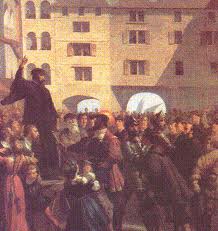 Prior to the Protestant Reformation, the idea of money-making being the primary goal of the most admired people in society, the goal of nations, and the major determinant of social success would have been strange indeed. Those whose primary goal had been money making, who demonstrated pecuniary motives had been looked at with suspicion and even contempt (see Wealth as Greed).
Prior to the Protestant Reformation, the idea of money-making being the primary goal of the most admired people in society, the goal of nations, and the major determinant of social success would have been strange indeed. Those whose primary goal had been money making, who demonstrated pecuniary motives had been looked at with suspicion and even contempt (see Wealth as Greed).
Following the Protestant Reformation the acquisition of wealth became an approved and worthy goal perhaps for the first time in history and this was a major factor in the rise of capitalism in Western society. The new capitalists no longer felt the guilt that encumbered medieval businessmen. Rather they came to be considered “the very pinnacle of morality itself since they testified to the bourgeois virtues of thrift, diligence, hard work, dedication, and persistence. Profits were the result, not of personal greed, but of application in a profession or vocation” (see Wealth as Reward).
At the same time poverty came to be seen as the result of personal inadequacies, laziness and immoral behaviour. Instead of giving alms to the poor as an act of Christian charity, it was increasingly thought necessary that the poor should be isolated from the rest of the population and punished (see Poverty as Punishment).
R. H. Tawney states in his Religion and the Rise of Capitalism that the significance of Calvinism consisted:
in its admission to a new position of respectability of a powerful and growing body of social interests, which, however irrepressible in practice, had hitherto been regarded by religious theory as, at best, of dubious propriety, and at worst, as frankly immoral.
The teachings of the early Protestant reformers were by no means obvious interpretations of the Bible,  which is ambiguous and contradictory enough to support various views of capitalism. But coinciding as they did with the rise of a middle class in Europe and an increase in commercial and business activity, their teachings were attractive to a sector of the population, which was itself becoming more powerful. John Calvin (pictured) preached to people who valued virtues such as diligence, thrift and entrepreneurial endeavour: “It is no accident that these urban merchants, bankers, and artisans were among the earliest and most fervent supporters of Calvinism. They found in this faith a reinforcing rationale for their belief in hard work and enterprise.”
which is ambiguous and contradictory enough to support various views of capitalism. But coinciding as they did with the rise of a middle class in Europe and an increase in commercial and business activity, their teachings were attractive to a sector of the population, which was itself becoming more powerful. John Calvin (pictured) preached to people who valued virtues such as diligence, thrift and entrepreneurial endeavour: “It is no accident that these urban merchants, bankers, and artisans were among the earliest and most fervent supporters of Calvinism. They found in this faith a reinforcing rationale for their belief in hard work and enterprise.”
Once the capitalist spirit took hold it was hard to resist or turn back. When businesspeople became capitalists, those in the same business either had to follow suit and give up their leisurely and relaxed way of doing business, or go out of business because they couldn’t compete with the ever expanding capitalist entrepreneurs.
Protestantism provided a conducive environment for capitalism to flourish in and the moral high ground from which to pursue profit freely and with good conscience. Similarly the new businessmen supported a church and faith that told them that what they wanted to do was in keeping with what God wanted them to do. Tawney stated:
The shrewd, calculating commercialism which tries all human relations by pecuniary standards, the acquisitiveness which cannot rest while there are competitors to be conquered or profits to be won, the love of social power and hunger for economic gain—these irrepressible appetites have evoked from time immemorial the warnings and denunciations of saints and sages. Plunged in the cleansing waters of later Puritanism, the qualities which less enlightened ages had denounced as social vices emerged as economic virtues.